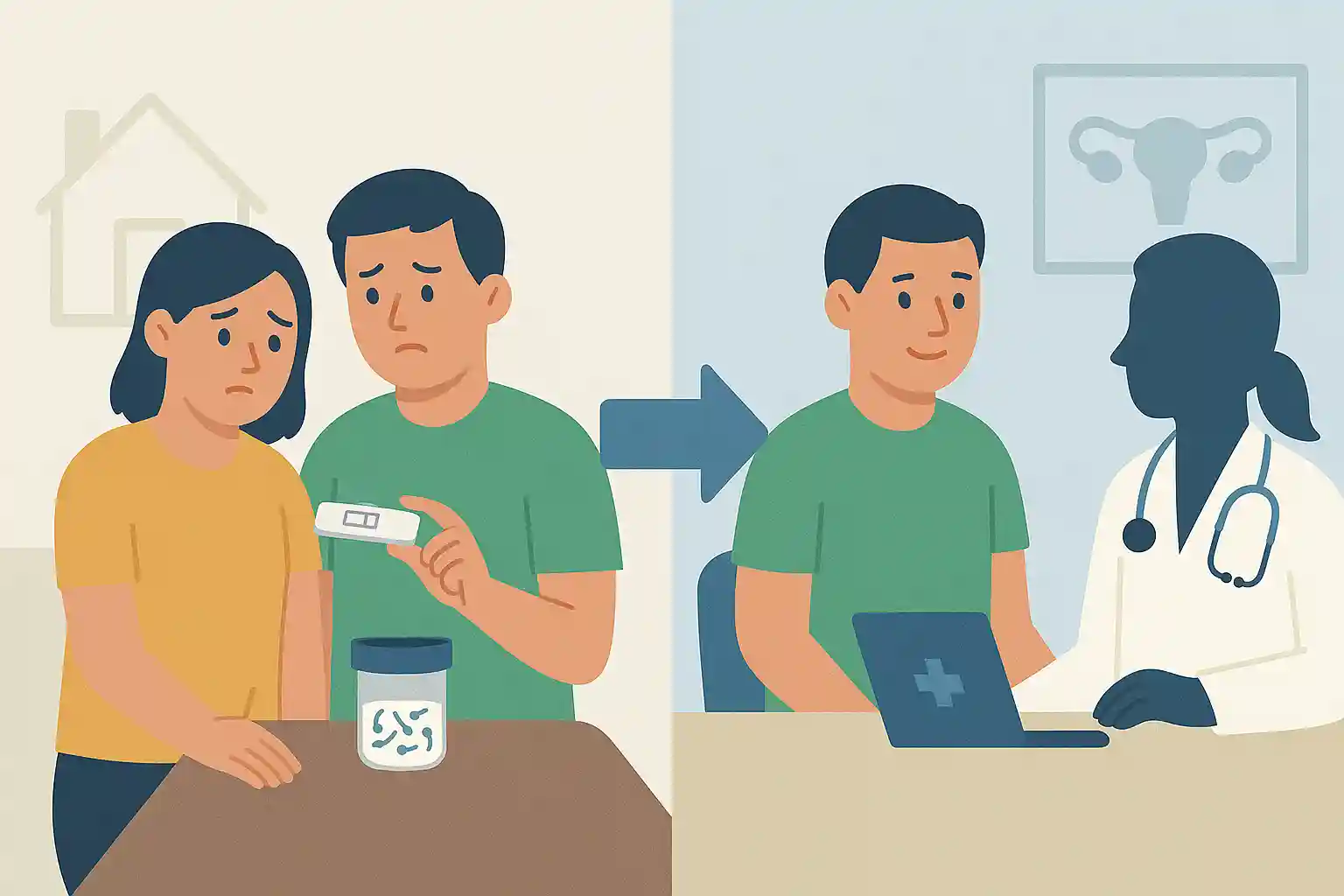At-home fertility tests have revolutionized how couples approach family planning, offering convenient and private ways to assess reproductive health. However, these tests have limitations, and knowing when to transition from self-testing to professional evaluation is crucial for your fertility journey. Understanding your results and recognizing red flags can help you make informed decisions about seeking specialized care.
Understanding At-Home Fertility Tests
At-home fertility tests typically measure key markers of reproductive health:
- Sperm count and concentration (for men)
- Anti-Müllerian Hormone (AMH) levels (for women)
- Follicle Stimulating Hormone (FSH) levels
- Luteinizing Hormone (LH) for ovulation prediction
- Some comprehensive panels include additional hormones
While these tests provide valuable baseline information, they represent only a snapshot of your fertility health and don't assess all factors that affect conception.
Red Flags That Warrant Immediate Professional Consultation
Certain test results or combinations of factors should prompt immediate consultation with a fertility specialist:
For Men:
- Sperm count below 15 million per milliliter
- Zero sperm detected (azoospermia)
- Very low motility or poor morphology
- Abnormal hormone levels (testosterone, FSH, LH)
- Signs of infection or blood in semen
For Women:
- Very low AMH levels (indicating low ovarian reserve)
- Elevated FSH levels (suggesting diminished ovarian function)
- Irregular ovulation patterns or anovulation
- Abnormal thyroid function
- Signs of PCOS or other hormonal disorders
Timeline Considerations for Seeking Help
Even with normal at-home test results, timing matters when it comes to professional consultation:
- Under 35: Seek help after 12 months of trying to conceive
- 35-40 years old: Consult a specialist after 6 months of trying
- Over 40: Consider immediate consultation, especially with any concerning test results
- Any age with known fertility risk factors: Don't wait—seek help early
When Normal Results Still Warrant Professional Help
Sometimes, professional consultation is necessary even when at-home tests appear normal:
- Consistent inability to conceive despite normal test results
- History of recurrent miscarriages
- Previous cancer treatment or exposure to toxins
- Family history of fertility problems or genetic disorders
- Known structural abnormalities (blocked tubes, fibroids)
- Chronic medical conditions affecting fertility
- Male partner with history of undescended testicles or varicocele
What At-Home Tests Can't Tell You
At-home fertility tests have important limitations that professional evaluation can address:
- Structural abnormalities (blocked fallopian tubes, uterine fibroids)
- Sperm DNA fragmentation and advanced sperm analysis
- Ovulation quality and timing issues
- Endometriosis or pelvic inflammatory disease
- Cervical mucus quality and compatibility
- Comprehensive hormone panels and their interactions
- Genetic factors affecting fertility
Preparing for Your Fertility Consultation
To make the most of your professional consultation, come prepared with:
- All at-home test results and dates performed
- Detailed menstrual cycle history
- Complete medical history for both partners
- List of current medications and supplements
- Previous pregnancy history and outcomes
- Lifestyle factors (diet, exercise, stress levels)
- Questions about treatment options and timelines
What to Expect from Professional Fertility Evaluation
Professional fertility assessment typically includes:
For Women:
- Comprehensive hormone testing
- Transvaginal ultrasound to assess ovaries and uterus
- Hysterosalpingography (HSG) to check fallopian tubes
- Possible laparoscopy if endometriosis is suspected
For Men:
- Comprehensive semen analysis
- Hormone testing (testosterone, FSH, LH)
- Physical examination
- Genetic testing if indicated
- Imaging studies if structural problems are suspected
Types of Fertility Specialists
Understanding different types of fertility professionals can help you choose the right care:
- Reproductive Endocrinologist (REI): Specialist in complex fertility issues
- Urologist: Focuses on male fertility problems
- OB/GYN with fertility training: General reproductive health
- Fertility counselor: Emotional support and guidance
- Genetic counselor: For hereditary concerns
Cost and Insurance Considerations
Before starting professional evaluation, understand the financial aspects:
- Check insurance coverage for fertility testing and treatment
- Understand what diagnostic tests are covered
- Ask about payment plans or financing options
- Consider the cost-benefit of early intervention
- Research state mandates for fertility coverage
Making the Decision
The decision to seek professional fertility help is personal and depends on multiple factors including your age, how long you've been trying, test results, and personal circumstances. At-home testing provides valuable initial insights, but it's just the beginning of understanding your fertility picture.
Remember that seeking professional help doesn't mean you've failed—it means you're taking proactive steps toward achieving your family goals. Early intervention often leads to better outcomes and can save time, money, and emotional stress in the long run.
Trust your instincts. If something doesn't feel right, if you have concerning symptoms, or if you're simply worried about your fertility, professional consultation can provide peace of mind and a clear path forward. Your fertility journey is unique, and having expert guidance can make all the difference in achieving your dreams of parenthood.


